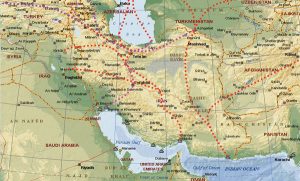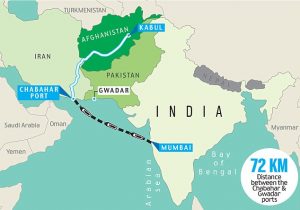Iran Looks to Create Persian Gulf – Black Sea Trade Corridor
 Iran has again expressed keen interest in developing a trade corridor between the Persian Gulf and the Black Sea, following meetings held in Tehran yesterday between Iranian Foreign Minister Mohammad Javad Zarif and his Georgian counterpart Mikheil Janelidze.
Iran has again expressed keen interest in developing a trade corridor between the Persian Gulf and the Black Sea, following meetings held in Tehran yesterday between Iranian Foreign Minister Mohammad Javad Zarif and his Georgian counterpart Mikheil Janelidze.
The idea has been around for some time, however regional political difficulties and sanctions placed upon Iran have meant progress has been slow. The trade would serve as a trade hub not just for the Middle East but West into Europe and East into Central Asia by creating a new transport corridor that would connect Iran, Armenia, Georgia and Bulgaria.
Bulgaria has also committed to the plan, which would bypass Turkey, and allow Iran to more productively use its transit potential in the region, playing a crucial role in cargo transportation from India and Persian Gulf countries to Europe through Central Asia, the Caucasus and Russia. Iran has been steadily building infrastructure to support this initiative, including enhancing rail lines, and jointly developing the
Iran has had political problems with Turkey in recent years, while Turkey has also been withdrawing from increasing cooperation with Europe. The lifting of Western sanctions on Iran has therefore reinvigorated the old plans to engage with the Caucasus countries as a route through to Europe and Central Asia. Such plans also involve India and to some extent Chinese ambitions. India is investing USD500 million in Iran’s Chabahar Port, which links Iran with India, bypassing Pakistan.
 China, which has also invested in the Pakistani Port of Gwaidor, also wants access to the Chabahar Port as it too wants access to Iranian energy supplies. Chabahar is Iran’s only Oceanic Port. Although China and India disagree on the overall concept of OBOR – as China’s version includes territory occupied by China and Pakistan yet claimed by Delhi – an alternative framework could be developed that would allow maritime cooperation. The China-Pakistan territorial issue aside, Indian academics are alert to the idea of further cooperation with China. Srinath Raghavan, a Senior Fellow at the Delhi-based Center for Policy Research, has commented “The OBOR provides New Delhi with an opening to engage with China especially after India realizing its limited options in dealing with Beijing whether it is the Nuclear Suppliers Group or banning Maulana Masood Azhar. The asymmetry of power between India and China in terms of economic resources and strategic presence has widened.”
China, which has also invested in the Pakistani Port of Gwaidor, also wants access to the Chabahar Port as it too wants access to Iranian energy supplies. Chabahar is Iran’s only Oceanic Port. Although China and India disagree on the overall concept of OBOR – as China’s version includes territory occupied by China and Pakistan yet claimed by Delhi – an alternative framework could be developed that would allow maritime cooperation. The China-Pakistan territorial issue aside, Indian academics are alert to the idea of further cooperation with China. Srinath Raghavan, a Senior Fellow at the Delhi-based Center for Policy Research, has commented “The OBOR provides New Delhi with an opening to engage with China especially after India realizing its limited options in dealing with Beijing whether it is the Nuclear Suppliers Group or banning Maulana Masood Azhar. The asymmetry of power between India and China in terms of economic resources and strategic presence has widened.”
Looking West, the Persian Gulf-Black Sea corridor begins from the Persian Gulf to the south of Iran, heads to the north of the country and then proceeds to Armenia and Azerbaijan, from where it reaches the Georgian ports of Poti and Batumi in the Black Sea. For here, Bulgarian ports also play a role via roll-on/roll-off ships used to get trucks to Greece. Trucks that head to Italy can also depart from southern Greek ports using these kinds of ships. Iran, Armenia, Azerbaijan, Georgia, Bulgaria and Greece all agreed on a draft communique to proceed. That is now coming to fruition, and may be approved by the end of this year.
About Us
Silk Road Briefing is published by Asia Briefing, a subsidiary of Dezan Shira & Associates. We produce material for foreign investors throughout Eurasia, including ASEAN, China, India, Indonesia, Russia & Vietnam. For editorial matters please contact us here and for a complimentary subscription to our products, please click here.
Dezan Shira & Associates provide business intelligence, due diligence, legal, tax and advisory services throughout the Asian and Eurasian region. We maintain offices throughout China, South-East Asia, India and Russia. For assistance with OBOR issues or investments into any of the featured countries, please contact us at silkroad@dezshira.com or visit us at www.dezshira.com





